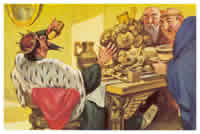Lesson 1.1A: Word Meaning
 Have you ever been reading and found there were words you didn't know or didn't understand? Did this make you frustrated? Did you eventually feel like giving up the task? Have you ever been reading and found there were words you didn't know or didn't understand? Did this make you frustrated? Did you eventually feel like giving up the task?
Word decoding strategies are important to help you understand new or difficult words. Using a dictionary is important, but there are other strategies you can use as well. It's important to have a good set of skills to fall back on as you read.

This lesson will focus on different word decoding strategies, and when and in what situations to use them.
What Does That Word Mean?
We constantly come across new words as we read. These new words could be scientific, technical, foreign, slang, or just plain new. Whatever form these new words take, it is important not to skip over them or consider these new words unimportant.
Think of some strategies you might use when you come across a new word. Your first answer might be, "I'd use a dictionary." This is certainly useful and common, but having to go to the dictionary every time can interrupt your reading. Can you think of some other word attack strategies? Do you think a writer gives clues in a passage that might help you understand or define a new word? The answer is yes.
We call these context clues. Context clues are hints that the author gives to help define a difficult or unusual word. If you didn't know what the phrase context clue meant, notice how you could continue on to read the next sentence and find it has been defined for you. That's a kind of context clue, and you didn't need to go to a dictionary to discover the meaning!
The next part of this lesson will focus on some practical strategies for understanding new words without needing to use a dictionary at every turn. We'll look at some of the words in a sample passage more closely, considering what strategy is used for each unfamiliar word.
Using Context Clues
Take a minute to think about how writers may give hints about what new words might mean in their writing. Here are some common types of context clues:
Definition
The writer provides a definition or restatement of the difficult word within the same sentence or one following.
A soloist is a person who performs a song alone without other instruments or singers.
The definition of soloist is given in the sentence.
OR
The company hired her because of her strong work ethic. She was the hardest working salesperson they had ever had.
The meaning of the phrase "work ethic" is clarified through the restatement "hardest working."
Example
An example of the unfamiliar word is provided within the context of the sentence.
A personal digital assistant (or PDA), like a Palm Pilot or Blackberry, is important in today's business world.
"Personal digital assistant" is made understandable by use of two examples.
Inference
The reader can make an educated guess as to the meaning of a difficult word based on facts or evidence.
The striker on a soccer team plays up front in a forward position and tries to score goals for the team.
The meaning of the word striker is made clear by other statements in the rest of the sentence, such as soccer team and forward position.
Root Word
The base form of a word once the prefixes and suffixes are removed.
The Canadian cultural experiment has attempted to forge a national culture based...not on the erasure of all remaining facets of difference, but on coexistence and co-operation, on consensus and multiplicity.
The words erasure and multiplicity contain root words: erase and multiply. A suffix, or ending, has been added to each. By looking at the root word, you now have two words you should be more familiar with.
The Story of King Midas
Let’s see how these context clues are used in the following passage:
 King Midas was a benevolent man, a kind-hearted (definition) leader, who ruled his kingdom fairly. He was, however, not one to think very deeply about what he said. One day, while walking in his garden, he saw an elderly satyr asleep in the flowers. Taking pity on the old fellow (definition), King Midas let him go without reprimand. When the god Dionysus heard how the King did not punish (definition) this wood-dwelling creature (inference), he rewarded King Midas by granting him one wish. The king thought for only a second and then said, "I wish for everything I touch to turn to gold." And so it was. King Midas was a benevolent man, a kind-hearted (definition) leader, who ruled his kingdom fairly. He was, however, not one to think very deeply about what he said. One day, while walking in his garden, he saw an elderly satyr asleep in the flowers. Taking pity on the old fellow (definition), King Midas let him go without reprimand. When the god Dionysus heard how the King did not punish (definition) this wood-dwelling creature (inference), he rewarded King Midas by granting him one wish. The king thought for only a second and then said, "I wish for everything I touch to turn to gold." And so it was.
The beautiful flowers in his garden turned toward the sun for light, but when Midas approached and touched them, they stood rigid and gold, and they were too firm (definition) to be picked. The king longed to pick them for his daughter, and when he returned to the palace to tell her, his lovely daughter, at his loving touch, turned hard and fast to gold. As the days went by the king grew hungrier and more emaciated, for each time he tried to eat, he found that his meal had also turned to gold (inference). His water, his bed, his clothes, his friends, and eventually the whole palace became gold.
King Midas saw that soon his whole kingdom would turn to gold unless he did something right away. He implored Dionysus, begging him tearfully (definition) to turn everything back to the way it had been and remove his golden touch. Because the king was so ashamed and very sad, Dionysus took mercy on him and granted his request. Yes, even Dionysus was capable of pity (definition). Instantly, King Midas was poorer that he had been, but richer, he felt, in the things that really count. |
The words in italics are probably new or difficult words. But if you notice, each of them has been made clearer within the passage by other words or phrases. These clarifying words have been set in bold type for you, and the type of context clue has been identified in parentheses. Notice which types of context clues were used.
The following table summarizes how context clues can help you to make sense of difficult words in the above passage. "My attempt" is what I thought the word meant before I consulted a dictionary. In the following guided practice, you will be given opportunities to use context clues and make an attempt at the definition before consulting a dictionary.
| Word: benevolent |
Word: satyr |
Word: reprimand |
| type of context clue: definition |
type of context clue: inference |
type of context clue: definition |
| Definition |
Definition |
Definition |
| My attempt: kind and nice |
My attempt: some kind of magical being found in the woods |
My attempt: discipline or punishment |
| Dictionary: well-meaning and kindly |
Dictionary: woodland god with a horse’s ear and tail |
Dictionary: to rebuke, scold, or discipline verbally |
Online dictionaries are also useful for defining new words. Check out the English 10 Web site to try some of these dictionaries.

Guided Practice Activity 1.1A1
Instructions: To complete a Guided Practice Activity, click on the above links. These activities are not to be submitted to your teacher. They are designed to help you to make sure you understand the course material that has been presned. Section assignments that are completed at the end of each section are to be submitted to your teacher for marking.
|
Summary
Completing this lesson has helped you to:
- understand how to use context clues
- look for signal words as you read
- use the dictionary when you need to as you read text
|

